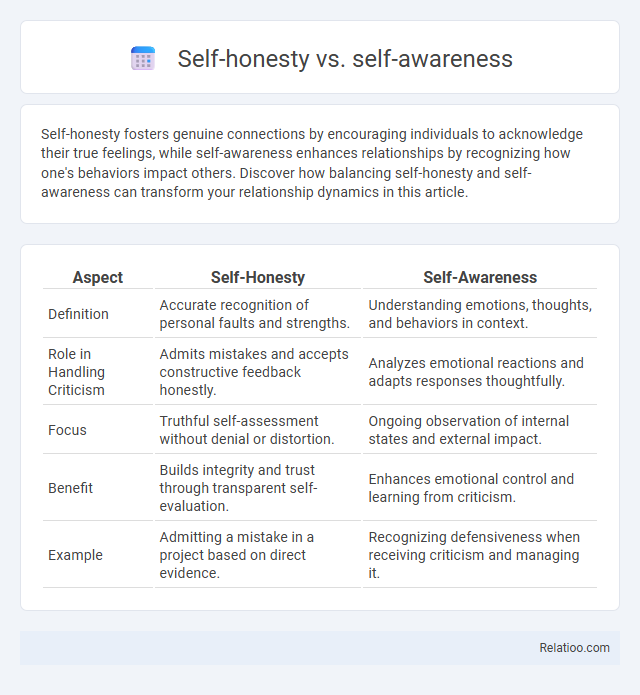Self-honesty fosters genuine connections by encouraging individuals to acknowledge their true feelings, while self-awareness enhances relationships by recognizing how one's behaviors impact others. Discover how balancing self-honesty and self-awareness can transform your relationship dynamics in this article.
Table of Comparison
| Aspect | Self-Honesty | Self-Awareness |
|---|---|---|
| Definition | Accurate recognition of personal faults and strengths. | Understanding emotions, thoughts, and behaviors in context. |
| Role in Handling Criticism | Admits mistakes and accepts constructive feedback honestly. | Analyzes emotional reactions and adapts responses thoughtfully. |
| Focus | Truthful self-assessment without denial or distortion. | Ongoing observation of internal states and external impact. |
| Benefit | Builds integrity and trust through transparent self-evaluation. | Enhances emotional control and learning from criticism. |
| Example | Admitting a mistake in a project based on direct evidence. | Recognizing defensiveness when receiving criticism and managing it. |
Understanding Self-Honesty: Definition and Importance
Self-honesty involves recognizing and accepting your true feelings, thoughts, and motives without denial or distortion. It differs from self-awareness, which is the broader ability to observe and understand your internal states and behaviors objectively. Embracing self-honesty allows you to make authentic decisions, fostering personal growth and emotional resilience.
What Is Self-Awareness? Key Concepts Explained
Self-awareness involves recognizing your own emotions, thoughts, and behaviors, fostering a clearer understanding of how you impact yourself and others. Unlike self-honesty, which centers on admitting your personal truths and flaws, self-awareness emphasizes ongoing observation and reflection without judgment. Improving your self-awareness enhances emotional intelligence, decision-making, and personal growth by aligning actions with inner values and goals.
The Relationship Between Self-Honesty and Self-Awareness
Self-honesty involves recognizing and admitting personal truths without denial, while self-awareness refers to the conscious knowledge of one's character, feelings, motives, and desires. The relationship between self-honesty and self-awareness is synergistic, as increased self-awareness fosters more accurate self-honesty by highlighting discrepancies between one's perception and reality. This interconnected dynamic plays a critical role in personal growth, emotional intelligence, and authentic decision-making.
Signs of True Self-Honesty in Everyday Life
Recognizing signs of true self-honesty in everyday life includes acknowledging personal mistakes without excuses, embracing uncomfortable truths about your behavior, and actively seeking growth rather than self-deception. While self-awareness involves understanding your emotions and thoughts, self-honesty requires a deeper commitment to integrity by confronting your authentic feelings and motivations. You can foster genuine self-honesty by consistently reflecting on your actions and holding yourself accountable in all situations.
Indicators of Genuine Self-Awareness
Genuine self-awareness is indicated by an accurate understanding of one's emotions, motivations, and behaviors without distortion. It involves recognizing personal strengths and weaknesses honestly, coupled with an openness to feedback and change. Unlike self-honesty, which centers on truthful admission of one's flaws, authentic self-awareness integrates this honesty with empathy and reflection, fostering deeper personal growth.
Barriers to Developing Self-Honesty and Self-Awareness
Barriers to developing self-honesty and self-awareness include cognitive biases such as self-deception, confirmation bias, and denial, which distort accurate self-perception. Emotional defenses like fear of vulnerability, shame, and ego protection hinder individuals from confronting uncomfortable truths about themselves. Lack of mindfulness practice and external feedback further impede the cultivation of both self-honesty and self-awareness, limiting personal growth and authentic self-reflection.
Practical Exercises for Cultivating Self-Honesty
Practical exercises for cultivating self-honesty include journaling personal thoughts and emotions to uncover authentic feelings and identify internal contradictions. Mindfulness meditation enhances self-awareness by promoting non-judgmental observation of thoughts, fostering a deeper connection between self-honesty and self-awareness. Engaging in honest self-reflection through techniques like asking probing questions encourages transparency, helping individuals align behaviors with core values and develop genuine self-integrity.
Effective Techniques to Increase Self-Awareness
Effective techniques to increase self-awareness include mindfulness meditation, journaling, and seeking constructive feedback from others. Mindfulness meditation enhances present-moment awareness, allowing individuals to observe their thoughts and emotions without judgment. Journaling helps track patterns in behavior and emotional responses, while feedback from trusted peers provides external perspectives crucial for deepening self-understanding and promoting self-honesty.
Comparing Benefits: Self-Honesty Versus Self-Awareness
Self-honesty promotes genuine personal growth by encouraging you to confront uncomfortable truths and align actions with core values, fostering accountability and integrity. In contrast, self-awareness enhances emotional intelligence by recognizing and understanding your thoughts and feelings, enabling better decision-making and interpersonal relationships. Both attributes complement each other, but self-honesty drives deeper transformation through candid self-examination, while self-awareness cultivates clarity and mindfulness.
Integrating Self-Honesty and Self-Awareness for Personal Growth
Integrating self-honesty and self-awareness fosters profound personal growth by enabling individuals to recognize and accept their true feelings, thoughts, and behaviors without distortion. Self-awareness provides an accurate perception of one's internal states and external actions, while self-honesty demands truthful reflection without denial or bias. This synergy enhances emotional intelligence, promotes authentic decision-making, and cultivates resilience in facing personal challenges.

Infographic: Self-honesty vs Self-awareness
 relatioo.com
relatioo.com